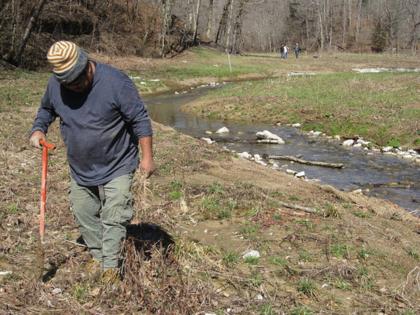Kentucky's top environmental official has 'grave concerns' about water pollution bill
Published in Science & Technology News
Kentucky’s top environmental official says she has “grave concerns” about a controversial bill that would allow more water pollution around the state on behalf of the coal industry and other business interests.
Kentucky Energy and Environment Secretary Rebecca Goodman sent a letter Tuesday to state Rep. Jim Gooch, chairman of the House Committee on Energy and Natural Resources, to raise objections to Senate Bill 89.
The state Senate approved the bill last week and sent it to the House for further action.
“The bill threatens the water quality of many Kentucky rivers, streams and tributaries and, as a result, would significantly compromise Kentucky’s groundwater, impacting the water quality of more than 31,000 private use wells and at least 156 public water systems,” Goodman wrote to Gooch.
“The bill would also require additional treatment for drinking and wastewater because fewer source waters would be protected, which would significantly impact water quality downstream,” Goodman wrote. “The increased costs of additional testing would be passed down to Kentuckians through utility rate increases — an extra cost Kentuckians do not need to bear in the face of rising costs at the grocery store and the gas pump.”
“Water is a valuable resource to Kentuckians. Degrading the commonwealth’s waters to the point that water quality is decreased, while costs increase, will negatively affect economic development opportunities for Kentucky,” Goodman wrote.
Democratic Gov. Andy Beshear appointed Goodman in 2019.
A spokeswoman for Gooch, R-Providence, and other House Republican leaders did not immediately respond to a request for comment Wednesday.
The Senate bill would narrow the definition of protected “waters of the commonwealth” used by the Kentucky Division of Water so it mirrors a 2023 U.S. Supreme Court decision that weakened the Environmental Protection Agency’s ability to enforce the federal Clean Water Act.
Currently, state environmental regulators are responsible for protecting “any and all rivers, streams, creeks, lakes, ponds, impounding reservoirs, springs, wells, marshes, and all other bodies of surface or underground water, natural or artificial.”
But the Supreme Court limited the definition of protected “navigable waters” to oceans, lakes, rivers, streams and wetlands that have a “continuous surface connection to those bodies.”
The Clean Water Act no longer covers wetlands and groundwater that do not have surface connections to those navigable waters, or temporary “ephemeral headwater streams” that flow into larger creeks, streams and rivers after heavy rains or snow melts.
Environmentalists warn that limiting state environmental oversight of these other waters in Kentucky puts at risk the drinking water supplies for hundreds of thousands of people. Groundwater and ephemeral streams become the sources of water for Kentuckians who rely on underground wells and downstream river water, respectively.
In her letter to the House committee chairman, Goodman made the same point.
“This bill would make Kentucky the only state in the United States to surrender its authority to define its waters to the federal government and jeopardize state regulatory primacy. This is not where Kentucky needs to be the exception,” she wrote.
Goodman included two maps with her letter, one showing domestic-use wells around Kentucky that are affected by groundwater and the other showing utilities that depend on groundwater. Eastern Kentucky coal mining counties show some of the heaviest reliance on private wells that use groundwater, according to the state map.
Supporters of the Senate bill say it will help the coal industry by relieving the regulatory burden that it faces from the Division of Water when it dumps its fill around a mine site.
“It’s time to stop letting the red tape choke the progress and start letting common sense lead the way,” the bill’s sponsor, state Sen. Scott Madon, R-Pineville, said on the Senate floor last week.
“As I always say when I’m talking about coal, God put coal under our feet so we can use it. It’s one of our greatest natural resources,” Madon said. “And it’s our job to push back on unelected bureaucrats that overstep and safeguard constituents from government overreach.”
_____
©2025 Lexington Herald-Leader. Visit kentucky.com. Distributed by Tribune Content Agency, LLC.







Comments